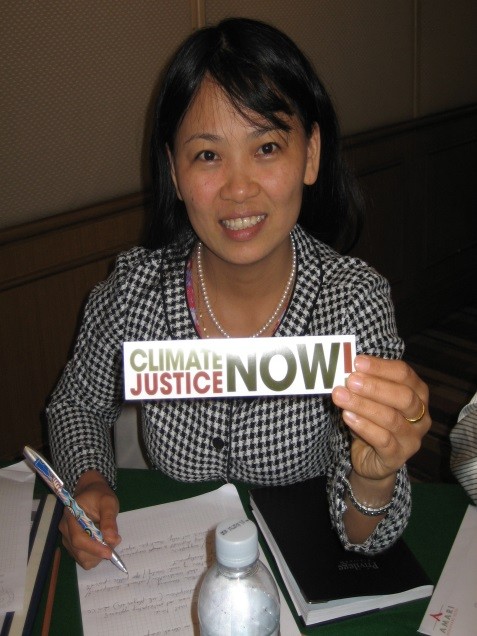
July 2015—Climate change is a serious threat to food security and agriculture in Vietnam. Nearly 1.1 million hectares, or 70 percent of the country’s total cultivable land, is threatened by a sea level rise of just 1 meter.
By 2030, rising sea levels will expose 45 percent of the cultivable land in the Mekong Delta—the country’s “rice basket”—to extreme salinization and crop damage, with rice productivity falling by at least 9 percent.
Pham Thi Dung is one of Vietnam’s climate change champions. A few years ago, as a resident of Hanoi, she was used to average January temperatures of around 60 degrees Fahrenheit and was not very aware of climate change.
But 2008 was no average year. As temperatures fell, her awareness rose.
“[It was] my first experience with extreme cold, with 40 days below 50 degrees Fahrenheit. It even plunged below freezing in the mountainous areas, which we had never experienced before,” Dung recalls.
The record-setting winter killed more than 8,000 cattle and destroyed 100,000 hectares of rice paddy. It was followed later in the year by an unseasonably intense storm, causing further losses in crops and livestock.
“I had heard about climate change before, but it didn’t really get my attention until I experienced it myself,” said Dung.
She shifted her career from environmental protection and became the climate change coordinator for Vietnam’s Ministry of Agriculture and Rural Development in 2008. In 2013, she applied for a program supported by USAID Adapt Asia-Pacific, which provides scholarships to government officials like Dung so they can build the skills necessary to help their institutions develop bankable climate change adaptation projects.
Dung is responsible for developing projects that help communities strengthen food security and deal with the predicted impacts of climate change. But preparing proposals for fundable adaptation projects is no easy task. With the program’s support, Dung attended Oxford University’s Adaptation Academy Foundation training course in August 2013. The course taught her to apply change theory to prepare sound projects that identify the most appropriate climate change adaptation interventions.
Dung has since applied her new skills to spearhead the design of a $3.6 million climate change project. It supports the implementation of the national strategy on climate change, which will pilot climate smart agriculture in coastal and mountainous areas to help the most vulnerable farming communities.
She also worked on a number of other projects, including a climate change impact assessment on aquaculture infrastructure as well as a project piloting adaptation solutions in coastal areas of central Vietnam—both of which went on to be funded and implemented through the ministry.
In just one year since her training, Dung is already helping her institution secure climate change funding to help the most vulnerable communities deal with the pressures of climate change, but she is not done yet.
“In 2015, I will continue to develop a climate change network in agriculture and rural development and try to get the voice of the people [heard] in terms of their needs and experiences, [as well as] non-government organizations, donors and other stakeholders into our action plan development process.”
The five-year USAID Adapt Asia-Pacific project, which began in 2011, is designed to help countries in Asia and the Pacific obtain financing to address climate change.
LINKS
Follow @USAIDAsia, on Facebook, on Flickr, on YouTube







Comment
Make a general inquiry or suggest an improvement.